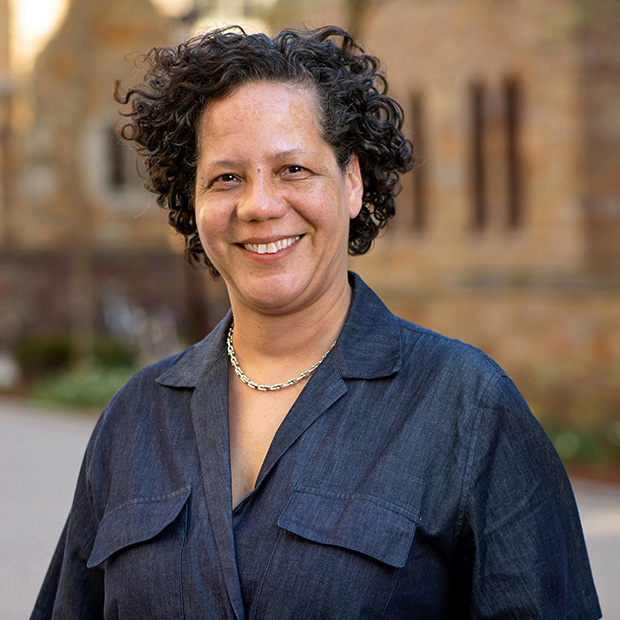A matter of public health
June 15, 2022 — As the daughter of a high school chemistry teacher (mom) and a high school and college math professor (dad), it’s not surprising that Melinda Pettigrew ’92 grew up with a strong leaning toward science.
 Melinda Pettigrew ’92
Melinda Pettigrew ’92
Photo: Mara Lavitt/
Yale University
“In third grade, my mom said I had to learn German because I’d need it when I got my Ph.D. in physics,” says Pettigrew, who is the Anna M. R. Lauder Professor of Epidemiology and deputy dean of the Yale School of Public Health.
“She signed me up for science camps and programs at the Museum of Science and Industry,” Pettigrew says. “She put me on that path, and I liked it, so it worked out well.”
Pettigrew, who grew up in Chicago’s Hyde Park neighborhood, has been at Yale for two decades. She’s a popular professor, researcher, and administrator with a strong interest in diversity and inclusion. Much of Pettigrew’s focus was influenced by her time at Grinnell, and it was during her third year at the College that she decided to go into public health.
“I remember the exact moment,” says Pettigrew, who majored in biology. “There was an epidemiologist from Johns Hopkins giving a talk about the AIDS pandemic. She spoke about the biology of the virus, the impact it was having on African communities, AIDS orphans – there was politics, economics, science, and history – and that’s when a lightbulb went off. Public health is all of these different disciplines and that’s when I decided I wanted to be an epidemiologist.”
At Grinnell, Pettigrew was especially inspired by her summer research with Psychology Professor Thomas Brozoski; by Professor Emeritus Charles Sullivan, a cell biologist and her advisor; and Associate Professor Emeritus Diane Robertson, who taught plant physiology. “I had no interest in plants, but she was such a great teacher, which showed me that if you have a great teacher, they can make anything exciting.”
After Pettigrew backpacked in Europe following graduation, she came home and worked as a lab technician, then attended graduate school at Yale, earning her Ph.D. in the epidemiology of microbial diseases in 1999. After a postdoctoral fellowship, she accepted a job at Yale’s School of Public Health.
“I knew I wanted to teach, but I wasn’t sure I wanted to spend all this time doing research. And I wasn’t confident at the time about getting grants and tenure because it’s very competitive. I should have felt like I was perfectly capable, but I just didn’t,” Pettigrew admits.
As it turned out, she’s been extraordinarily successful.
“I joined the school’s education committee and eventually became the academic affairs dean. I was able to have a lot of input on the curriculum and academic programs,” Pettigrew says. “I worked on training people to teach – and teach well.”
“I really loved Grinnell,” she continues. “The teaching was excellent and that, along with the importance of service, are two things I’ve carried with me. I felt that Grinnell students were there because they were interested in learning. I try to instill that within my students. I want to see what gets them excited, and not look at education as a commodity and being all about grades.”
Besides teaching and administration, Pettigrew is a molecular epidemiologist. “We look at who gets sick, when, and where,” she says. “We use genome sequencing to identify and track specific strains of bacteria, and we use that information to identify sources of infection and outbreaks. This data helps us determine the best methods of prevention and control.”
She also works with the Antibiotic Resistance Leadership Group. “Antibiotic resistance is one of the top 10 global threats,” Pettigrew says. “About 700,000 people a year die from it and one of the biggest risk factors is overuse and misuse of antibiotics.” In addition, Pettigrew is involved in One Health; she studies how antibiotic use on farms contributes to the overall problem of antibiotic resistance.
She’s been chair of the school’s Diversity, Equity, and Inclusion Committee, working on fair and equitable promotion, appointment, and hiring practices. She also oversees diversity efforts in her antibiotic resistance research group, working to increase diversity of clinicians and scientists, as well as within clinical trials and studies.
During the COVID-19 pandemic, Pettigrew continued teaching, but much of her time was spent shifting curriculum online, training faculty in online teaching, helping stranded students, and later, working on campus safety as well as vaccine and masking policies. “Like everyone else I’ve been navigating some strong opinions. Several members of my own family didn’t want to get vaccinated. So, I’ve been thinking a lot about health communication and effective messaging.”
Pettigrew is now preparing for a new role. On July 1, Pettigrew takes over as interim dean of the Yale School of Public Health. She’s embracing it as another opportunity to try things.
“You have to find something you love,” she says. “I work a tremendous number of hours and I love public health. Also, the value of mentorship, of someone who pushes you beyond your comfort zone, can’t be overestimated.”
— by Anne Stein ’84